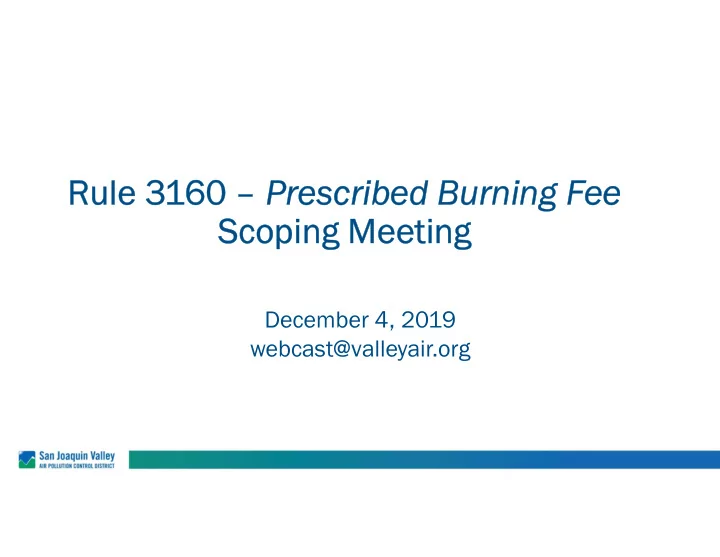

Rule 3160 – Prescribed Burning Fee Scoping Meeting December 4, 2019 webcast@valleyair.org
Purpose of Today’s Meeting • Kick-off the public rule development process for potential changes to the District’s prescribed burning fee rule (District Rule 3160) • Share information regarding potential changes under consideration • Seek public input • Review opportunities for further public engagement • Discuss next steps and rulemaking timeline 2
Wildfire Air Quality Impacts • Air pollution generated from wildfires can be enormous and well exceed total industrial and mobile source emissions in San Joaquin Valley overwhelming all control measures • Wildfires generate particulate, NOx, VOC and other pollutants • Cause excessively high PM2.5 and ozone concentrations – High PM2.5 levels during summer (generally low PM2.5 in summer) – Peak ozone levels this season due to wildfire pollution • District supporting efforts to develop more effective fuel reduction strategies – Fuel buildup is key factor in causing increasing severe fires 3
District Supports Prescribed Burning and Other Fuel Reduction Efforts • District has long been supportive of prescribed burning and other fuel reduction efforts such as mechanical thinning • Prescribed burning has been used as a land management tool to mimic natural fires and bring better health to the forest ecosystem under planned and controlled conditions that lessen air quality impacts • Since November 2015, District has worked with land managers to enhance fuel reduction strategies aimed at minimizing wildfire impacts 4
Enhanced Strategies in Support of Prescribed Burning • Flexible in decision-making for proposed prescribed burn projects • Allowed projects to occur even under marginal dispersion conditions, being careful to ensure projects were remote in location and nearby communities were not impacted • Authorized all requested prescribed burning without requiring segmentation of burn projects into multiple smaller burns resulting in quicker project completion, while also reducing personnel costs 5
Rule 3160 – Prescribed Burning Fee • Provides the District with a means to recover costs associated with implementing its obligatory smoke management duties as mandated by state law • Applies to any agency or person that conducts prescribed burning within the District’s jurisdiction • On an annual basis, agencies/persons must report acreage burned • Fees are assessed annually for the previous calendar year based on: – Number of blackened acres for broadcast burning – Number of acres treated for pile burning • First 40 acres are not subject to the fee 6
New Statewide Prescribed Burn Reporting and Monitoring Support Program • AB 1260 –Required ARB and local air districts to enhance air quality and smoke monitoring associated with prescribed burns • CARB’s 2018-19 Budget contains $2,000,000 to implement the new Prescribed Burn Reporting and Monitoring Support Program • In June 2019, District entered into MOU to participate in the new program –District may be reimbursed for prescribed burn program implementation costs up to $122,500 over the next two years 7
Why the District Is Considering Amending Rule 3160 • Reimbursement under the MOU may fund in whole, or in part, the District’s prescribed burn program • Rule 3160 does not currently provide a mechanism by which the District can suspend or prorate the established fees when alternative funding is available • District Governing Board directed staff to develop potential amendments to provisionally suspend the collection of fees on the condition that adequate funding is received from the state to cover the costs associated with administering and implementing the District’s prescribed burn program 8
Potential Changes to Rule 3160 • Fees would be provisionally suspended, or collected on a prorated basis, based on the amount of funding received from the state relative to the District’s prescribed burning program costs • May limit eligibility for suspended/prorated fees to projects that benefit the public interest by providing an enhancement of public safety or a long-term air quality benefit 9
Next Steps… January 15: February 18: Public Workshop, Final Draft of Rule December 4: Discuss Draft Newspaper District Scoping Amendments, Publication Date & Meeting & Opening Opening of Two- Opening of Public of Two-Week Week Commenting Commenting Commenting Period Period Period March 19: December 18: January 29: Public Hearing End of Scoping End of Rule at Governing Meeting Workshop Board Meeting Commenting Commenting Period Period 10
Comment Period Please submit comments in writing by December 18, 2019, at 5:00 pm Contact: Jason Lawler, Senior Air Quality Inspector Email: jason.lawler@valleyair.org By Mail: San Joaquin Valley APCD 1990 E. Gettysburg Avenue Fresno, CA 93726 Phone: (559) 230-5994 11
Comments? 12
Recommend
More recommend